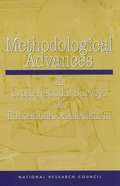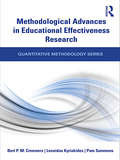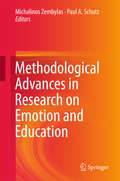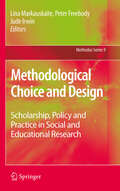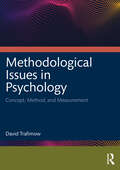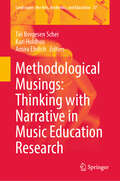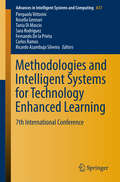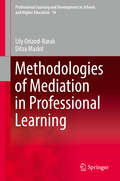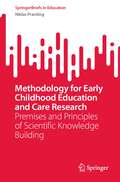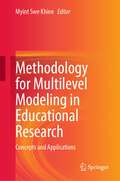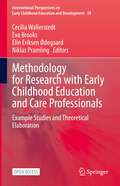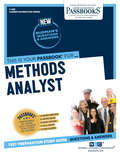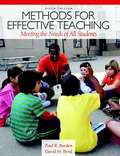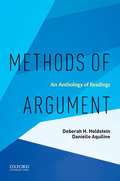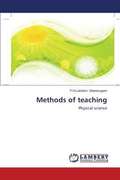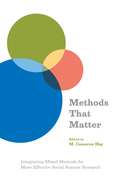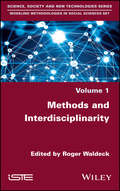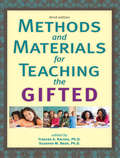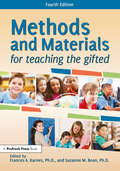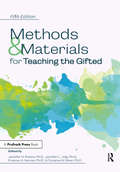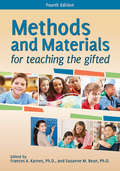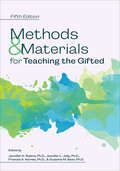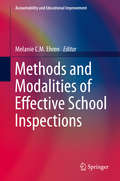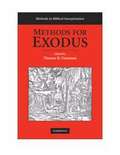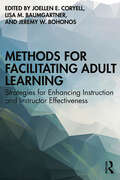- Table View
- List View
Methodological Advances in Cross-National Surveys of Educational Achievement
by Board on International Comparative Studies in EducationIn November 2000, the Board on International Comparative Studies in Education (BICSE) held a symposium to draw on the wealth of experience gathered over a four--decade period, to evaluate improvement in the quality of the methodologies used in international studies, and to identify the most pressing methodological issues that remain to be solved. Since 1960, the United States has participated in 15 large--scale cross--national education surveys. The most assessed subjects have been science and mathematics through reading comprehension, geography, nonverbal reasoning, literature, French, English as a foreign language, civic education, history, computers in education, primary education, and second--language acquisition. The papers prepared for this symposium and discussions of those papers make up the volume, representing the most up--to--date and comprehensive assessment of methodological strengths and weaknesses of international comparative studies of student achievement. These papers answer the following questions: (1) What is the methodological quality of the most recent international surveys of student achievement? How authoritative are the results? (2) Has the methodological quality of international achievement studies improved over the past 40 years? and (3) What are promising opportunities for future improvement?
Methodological Advances in Educational Effectiveness Research (Quantitative Methodology Series)
by Leonidas Kyriakides Pam Sammons Bert P.M. CreemersMethodological Advances in Educational Effectiveness Research is an important new work by some of the leading researchers in the field of Educational Effectiveness Research (EER). The book provides a state of the art snapshot of the methodology of EER now and clearly demonstrates the way it is applied in both research and evaluation. It shows how developments in the research methodology area such as the use of multilevel modelling approaches to analyse nested data have promoted the knowledge-base of educational effectiveness. But at the same time, as the authors show, the knowledge-base of educational effectiveness and the attempt to establish theoretical models do paradoxically challenge the development of methodologically appropriate studies including ways of analysing data. Guiding readers though the effective and appropriate use in educational effectiveness of: Longitudinal Studies Experimental Studies Mixed Research Methods Meta-analyses of effectiveness studies Using IRT to measure outcomes and factors Using Generalisability Theory to test the quality of data Multilevel modelling , and Structural Equation Modelling Techniques The authors draw in the expertise of scholars from around the world to show the mathematical background of each technique, the current and future applications, and Specific examples of applying this orientation to help the readers design their own effectiveness studies using specific methodological tools.
Methodological Advances in Research on Emotion and Education
by Michalinos Zembylas Paul A. SchutzThis volume presents different conceptual and theoreticalframeworks as well as research methods that have helped educational researchersto study emotions. It includes innovative approaches that push themethodological boundaries that have served educational researchers until nowand proposes new ways of researching emotions in educational contexts. In particular,this edited volume provides a historical frame for studying emotions. Itconnects theoretical/epistemological views with choice of research methods and describes specificmethods helpful in doing research on emotions as they are grounded in differenttheoretical and disciplinary traditions such as psychology, philosophy,sociology, history, political science, cultural studies, and feminist studies. Finally, it appreciates the contextual and international dimensions of studyingemotions in education and contributes to ongoing debates about the implicationsof our methodological choices for understanding emotion in education. Thiscombination of variety, timeliness, potential for transformation of the field,and uniqueness make this a very valuable resource to introduce new scholars inthe field alongside established scholars.
Methodological Choice and Design
by Lina Markauskaite Peter Freebody Jude IrwinBeginning and well-seasoned researchers alike face significant challenges in understanding the complexities of research designs arising from both within and across methodological paradigms, and in applying them in ways that maximise impact on knowledge, practice, and policy. This volume engages educational and social researchers in a scholarly debate offering some crucial re-interpretations of established research methodologies in light of contemporary conditions and critical introduction to some contemporary research approaches yet to gain general recognition. This book is a contemporary vademecum for researchers, practitioners and graduate students on research methodologies and designs for educational and social change in today's world. The chapters chart and analyse the conceptual and practical complexities of a variety research designs for contemporary educational and social work research. This anthology, taken overall, provides readers with the knowledge and understanding needed not only to design technically sound and coherent research studies, but also to develop methodologically innovative research projects that cross the boundaries between different methodological traditions to the benefit of scholarship, policy, and practice. The chapters cover nine research approaches: - Design-based research - Action research - Ethnomethodological research - Negotiated ethnography - Arts-informed research - Historical analysis and postcolonial scholarship - Policy analysis - Comparative research - Quantitative modelling of correlational and multi-level data The book provides a critical discussion of epistemological questions and methodological frontiers: - Knowledge and epistemology in scholarship, practice and policy - Digital knowledge and digital research - Emerging methodological challenges for educational research - Challenges and futures for social work and social policy research methods - Methodology and the knowledge industry
Methodological Issues in Psychology: Concept, Method, and Measurement
by David TrafimowMethodological Issues in Psychology is a comprehensive text that challenges current practice in the discipline and provides solutions that are more useful in contemporary research, both basic and applied. This book begins by equipping the readers with the underlying foundation pertaining to basic philosophical issues addressing theory verification or falsification, distinguishing different levels of theorizing, or hypothesizing, and the assumptions necessary to negotiate between these levels. It goes on to specifically focus on statistical and inferential hypotheses including chapters on how to dramatically improve statistical and inferential practices and how to address the replication crisis. Advances to be featured include the author's own inventions, the a priori procedure and gain-probability diagrams, and a chapter about mediation analyses, which explains why such analyses are much weaker than typically assumed. The book also provides an introductory chapter on classical measurement theory and expands to new concepts in subsequent chapters. The final measurement chapter addresses the ubiquitous problem of small effect sizes in psychology and provides recommendations that directly contradict typical thinking and teaching in psychology, but with the consequence that researchers can enjoy dramatically improved effect sizes. Methodological Issues in Psychology is an invaluable asset for students and researchers of psychology. It will also be of vital interest to social science researchers and students in areas such as management, marketing, sociology, and experimental philosophy.
Methodological Musings: Thinking with Narrative in Music Education Research (Landscapes: the Arts, Aesthetics, and Education #37)
by Kari Holdhus Tiri Bergesen Schei Amira EhrlichThis book focuses on narrative forms of research and inquiry in music education. As narrative approaches gain momentum, questions of methodology become salient. This research anthology highlights a diverse array of narrative methodologies and offers strategies for new researchers. The authors reflect transparently on how they did their narrative analyses, how they position themselves, and which narrative tradition(s) they align with. In this book, editors and authors aim at conceptualizing and clarifying narrative approaches in music education, showing how narrative thinking can be combined with theoretical stances such as discourse analysis and phenomenology. The book demonstrates how awareness of multi-layered dialogical meaning production can inform narrative research. It also addresses performative narratives of musicians and educators. The authors forefront narrative research methods as highly valuable for arts-based research, because of their potential for being expressive and performative, as well as conceptual.
Methodologies and Intelligent Systems for Technology Enhanced Learning
by Rosella Gennari Pierpaolo Vittorini Tania Di Mascio Sara Rodríguez Fernando De la Prieta Carlos Ramos Ricardo Azambuja SilveiraThis book presents the outcomes of the 7th International Conference in Methodologies and Intelligent Systems for Technology Enhanced Learning (MIS4TEL'17), hosted by the Polytechnic of Porto, Portugal from 21 to 23 June 2017. Expanding on the topics of the previous conferences, it provided an open forum for discussing intelligent systems for technology enhanced learning (TEL) and their roots in novel learning theories, empirical methodologies for their design or evaluation, stand-alone and web-based solutions, and makerspaces. It also fostered entrepreneurship and business startup ideas, bringing together researchers and developers from industry, education and the academic world to report on the latest scientific research, technical advances and methodologies.
Methodologies of Mediation in Professional Learning
by Lily Orland-Barak Ditza MaskitThis book critically explores the use of nine recognized methodologies for the mediation of professional learning in the context of teacher education: The story, the visual text, the case, the video, the simulation, the portfolio, lesson study, action research, and Information and Communication Technologies (ICT). Drawing on theories of mediation and professional learning, the book establishes connections between theoretical, empirical and practical-based aspects of each of these methodologies. It consolidates a body of knowledge that offers a holistic portrayal of these methodologies in terms of their purposes (what for), processes (how), and outcomes (what), both distinctively and inclusively. Each chapter offers four perspectives on each methodology (1) theoretical groundings of the genre (2) research-based evidence on methodologies-as-pedagogies for mediating teacher learning (3) mediation tasks for teacher education as reported in studies and (4) a synthesis of recurrent themes identified from selected books and articles, including a comprehensive list of publications organized by decades. The last chapter presents an integrative framework that conceptualizes connections and weak links across the different methodologies of mediation.
Methodology for Early Childhood Education and Care Research: Premises and Principles of Scientific Knowledge Building (SpringerBriefs in Education)
by Niklas PramlingThis book concisely explores the distinguishing features of scientific knowledge and research in early childhood education and care (ECEC). It has a dual-level focus of containing and relating the concrete practices of conducting research with the more fundamental conceptual discussions around research – the Bildung of the researcher.The book introduces and succinctly explains the concepts of methodology, theoretical knowledge about method, and how all parts of conducting research are informed by theory. The interrelation of these concepts, and many premises of research, are often regarded as assumed knowledge. In this book, premises of research are explicated and discussed, as well as methods on how to engage in informed dialogue.This introductory text explicates many features of scientific knowing and knowledge building in ECEC that tend to be presumed rather than clarified. It will be important in furthering the professional development of PhD students, Master’s students, supervisors, and researchers.
Methodology for Multilevel Modeling in Educational Research: Concepts and Applications
by Myint Swe KhineThis edited volume documents attempts to conduct systematic and prodigious research using multilevel analysis in educational settings, and present their findings and identify future research directions. It showcases the versatility of multilevel analysis, and elucidates the unique advantages in examining complex and wide-ranging educational issues. This book brings together leading experts around the world to share their works in the field, highlighting recent advances, creative and unique approaches, and innovative methods using multilevel modeling and theoretical and practical aspects of multilevel analysis in culturally and linguistically-diverse educational contexts.
Methodology for Research with Early Childhood Education and Care Professionals: Example Studies and Theoretical Elaboration (International Perspectives on Early Childhood Education and Development #38)
by Niklas Pramling Eva Brooks Elin Eriksen Ødegaard Cecilia WallerstedtThis open access book addresses the growing trend in the field of early childhood education and care (ECEC) research named collaborative knowledge building in which researchers and ECEC personnel collaborate. This kind of research encompasses a number of approaches, such as design studies, action studies, Learning Studies, Lesson Studies, and combined research and development studies. There are important differences between these approaches, but they also share some features, which makes it possible to see them as examples of a particular tradition of knowledge building. Collaborative knowledge building constitutes close ties between developing practices of early childhood education and care, and generating empirically grounded theoretical knowledge. This book contributes to the methodology of practices-developing research by mapping this movement through exemplifying themes actualised in such studies, and through conceptualizing important and recurring gains and challenges. It also describes how the latter can be taken on.
Methods Analyst: Passbooks Study Guide (Career Examination Series)
by National Learning CorporationThe Methods Analyst Passbook® prepares you for your test by allowing you to take practice exams in the subjects you need to study. It provides hundreds of questions and answers in the areas that will likely be covered on your upcoming exam, including but not limited to: Administrative analyst; Supervision; Understanding and interpreting written material; and more.
Methods For Effective Teaching: Meeting The Needs Of All Students
by Paul R. Burden David M. ByrdThe sixth edition of Methods for Effective Teaching provides the most current research-based coverage of teaching methods for K-12 classrooms on the market today. In a straightforward, user-friendly tone, the expert author team writes to prepare current and future educators to be effective in meeting the needs of all the students they teach. In this new edition, all content is carefully aligned to professional standards, including the recently revised InTASC standards. Uniquely emphasizing today's contemporary issues, such as both teacher-centered and student-centered strategies; a myriad of ways to differentiate instruction, promote student thinking, and actively engage students in learning; approaches for teaching English language learners, and an added emphasis on culturally responsive teaching, this highly-regarded textbook is the perfect combination of sound teaching methods and cutting edge content.
Methods Of Argument: An Anthology Of Readings
by Deborah Holdstein Danielle Aquiline"This reader is designed to support Composition II courses focused on methods and techniques of argument. The selections will model an array of critical thinking as well as argumentative writing techniques by which one can argue a single point of view and also more complex, mixed forms of argumentation. The goal will always be to model how a student may respond, in writing and discussion, with an accountable, well-supported viewpoint. In a current climate of 'fake news' and 'alternative facts,' this reader provides a timely and compelling context in which to offer students opportunities to craft reasoned arguments with evidence. Selections will be framed by an introduction featuring a narrative on analyzing and writing arguments, the importance of accountability (including challenging others' less-than-compelling arguments), and information on the reading and writing process. Selections themselves will comprise both classic and contemporary sources and be diverse in origin, genre, and topic"--
Methods Of Teaching
by P.N. Lakshmi ShanmugamThis book “METHODS OF TEACHING “ covers various methods of teaching in Physical Science as creative and engaging as possible. Students get the most out of their learning when it is exciting and this book offers great ideas for classroom practice, which are carefully linked to research. It helps the students in achieving higher teaching competence through microteaching. It becomes a key for unlocking new perspectives in the process of training. Various methods of teaching like lecture, lecture cum demonstration, project, seminar, team teaching and scientific method help the teachers to teach lessons in real conditions. Illustrations from physical science is the most influential innovation to teachers for improving effectiveness of the existing teaching skill.
Methods That Matter: Integrating Mixed Methods for More Effective Social Science Research
by M. Cameron HayTo do research that really makes a difference--the authors of this book argue--social scientists need questions and methods that reflect the complexity of the world. Bringing together a consortium of voices across a variety of fields, Methods that Matter offers compelling and successful examples of mixed methods research that do just that. In case after case, the researchers here break out of the traditional methodological silos that have long separated social science disciplines in order to better describe the intricacies of our personal and social worlds. Historically, the largest division between social science methods has been that between quantitative and qualitative measures. For people trained in psychology or sociology, the bias has been toward the former, using surveys and experiments that yield readily comparable numerical results. For people trained in anthropology, it has been toward the latter, using ethnographic observations and interviews that offer richer nuances of meaning but are difficult to compare across societies. Discussing their own endeavors to combine the quantitative with the qualitative, the authors invite readers into a conversation about the best designs and practices of mixed methodologies to stimulate creative ideas and find new pathways of insight. The result is an engaging exploration of a promising new approach to the social sciences.
Methods and Interdisciplinarity
by Roger WaldeckInterdisciplinarity research results from a growing need for multi-perspective methods, and knowledge on complex and multifaceted objects of study. It is not simply scientific research that involves several disciplines, but ultimately, the aim is confronting this knowledge and – if possible – articulating it coherently. Using specific examples, Methods and Interdisciplinarity categorizes the different modes of interdisciplinarity and discusses the mechanisms of hybridization between them. On the one hand, the book shows how the same issue can be treated according to various points of view from several disciplines, which can give rise to complementary or even contradictory knowledge. On the other hand, it illustrates how methods from some disciplines make it possible to articulate the qualitative or quantitative approaches of others.
Methods and Materials for Teaching the Gifted
by Frances A. Karnes M. Bean SuzanneFor teachers at the elementary and secondary levels, this guide outlines strategies for teaching gifted learners. Karnes (curriculum, instruction, and special education, U. of Southern Mississippi) and Bean (education, Mississippi U. for Women) bring together 23 chapters that cover the characteristics and needs of gifted learners, curricular design, process skills development, instructional units, evaluating outcomes, supporting and enhancing gifted programs, and practices such as problem-based learning, creative teaching strategies, independent study, mentorships, and classroom simulations. Chapter authors are scholars, researchers, and consultants in gifted education in the US. In addition to being revised and expanded, this edition includes teacher statements and discussion questions in each chapter. Annotation ©2009 Book News, Inc. , Portland, OR (booknews. com)
Methods and Materials for Teaching the Gifted
by Frances A. Karnes Suzanne M. BeanThe newly revised and updated fourth edition of Methods and Materials for Teaching the Gifted is an excellent introduction to gifted education and real-world learning. The chapters of this comprehensive textbook are written by respected leaders in the field of gifted education. The authors review the unique needs of gifted learners and give current information on instructional planning and evaluation, strategies for best practices, and ongoing enhancement and support of gifted programs. Chapters include topics such as differentiated curricular design, extending learning through research, writing challenging instructional units, and developing leadership skills and innovative thinkers. Instructional practices such as problem-based learning, technology literacy, independent study, simulation and gaming, and more are addressed. A special focus is given to using the Gifted Education Programming Standards and Common Core State Standards. The fourth edition provides updated information on funding sources and public relations strategies for gifted education programs. It also includes updated lists of books, teaching materials, websites, and other resources for teachers of the gifted.
Methods and Materials for Teaching the Gifted
by Jennifer L. Jolly Frances A. Karnes Suzanne M. Bean Jennifer H. RobinsThe completely revised and updated fifth edition of Methods and Materials for Teaching the Gifted:Provides a comprehensive examination of the most current research and best practices in the field of gifted education.Addresses identification, twice-exceptionality, and culturally and linguistically diverse learners.Includes chapters related to designing curriculum and differentiating instruction.Covers developing critical and creative thinking, as well as encouraging talent development.Features chapter authors who are recognized researchers, practitioners, and leaders in the field of gifted education.The chapters are organized to promote critical thinking and discussion about each topic. This text is a complete resource curated for a wide range of K-12 educators and those working with inservice and preservice educators and administrators.
Methods and Materials for Teaching the Gifted
by Frances Karnes Suzanne BeanThe newly revised and updated 'Methods and Materials for Teaching the Gifted' offers strategies and resources for differentiating instruction for gifted learners. The book acts as an excellent introduction to gifted education curricular planning, instructional unit design, evaluation, and teaching methods. The chapters of this comprehensive textbook are written by respected leaders in the field of gifted education. The authors review the needs ofgifted learners, instructional planning and evaluation, strategies for best practices, and ongoing enhancement and support of gifted programs. Chapters include topics such as differentiated curricular design, extending learning through mentorships, building challenging instructional units, and developing creative thinking. Also, instructional practices, such as problem-based learning, independent study, classroom simulations, and more are addressed. The third edition includes a brand-new chapter on educational technology for the gifted, as well as updated information on books, teaching materials, Web sites, and other resources for differentiating instruction and planning gifted education curriculum. Educational Resource
Methods and Materials for Teaching the Gifted (Other Ser.)
by Jennifer Jolly Jennifer RobinsThe completely revised and updated fifth edition of Methods and Materials for Teaching the Gifted:Provides a comprehensive examination of the most current research and best practices in the field of gifted education.Addresses identification, twice-exceptionality, and culturally and linguistically diverse learners.Includes chapters related to designing curriculum and differentiating instruction.Covers developing critical and creative thinking, as well as encouraging talent development.Features chapter authors who are recognized researchers, practitioners, and leaders in the field of gifted education.The chapters are organized to promote critical thinking and discussion about each topic. This text is a complete resource curated for a wide range of K-12 educators and those working with inservice and preservice educators and administrators.
Methods and Modalities of Effective School Inspections
by Melanie C.M. EhrenThis book provides an overview anddiscussion of the evidence base of effective school inspections; reflecting on issuesof validity and reliability of school inspections in relation to schooleffectiveness research, unintended consequences and emergent roles andresponsibilities of Inspectorates of Education. Chapters include findings from systematicliterature reviews and primary research while also presenting a range ofpractical examples from inspections systems from all over the world. The bookprovides relevant background materials for Inspectorates of Education who aimto improve the effectiveness of their systems and working methods, as well as clearexamples for researchers aiming to analyse and understand the effectiveness ofthese systems. The final chapter reflects on changes in the currenteducation landscape and discusses newer models of school inspections that fitwithin a more decentralized inspection system.
Methods for Exodus
by Thomas B. DozemanMethods for Exodus is a textbook on biblical methodology. The book introduces readers to six distinct methodologies that aid in the interpretation of the book of Exodus: literary and rhetorical, genre, source and redaction, liberation, feminist, and postcolonial criticisms. Describing each methodology, the volume also explores how the different methods relate to and complement one another. Each chapter includes a summary of the hermeneutical presuppositions of a particular method with a summary of the impact of the method on the interpretation of the book of Exodus. In addition, Exodus 1-2 and 19-20 are used to illustrate the application of each method to specific texts. The book is unique in offering a broad methodological discussion with all illustrations centered on the book of Exodus.
Methods for Facilitating Adult Learning: Strategies for Enhancing Instruction and Instructor Effectiveness
by Joellen E. Coryell, Lisa M. Baumgartner Jeremy W. BohonosThis book equips instructors with fresh, practical teaching and training methods to support adult learning in both formal and continuing educational environments.An extensive, how-to guide, Methods for Facilitating Adult Learning covers adult teaching and learning fundamentals, collaborative teaching methods, methods for facilitating autonomous learning, community-based teaching methods, and technology-enhanced teaching and learning approaches. Readers will emerge with an in-depth understanding of each method, made comprehensive by the inclusion of definitions, philosophical and/or theoretical underpinnings, advantages and limitations, practical guidelines for application, and ample real-world examples.Ideal for any educator working with adult learners, this book offers a toolbox of approaches designed to enhance reader understanding and practice of adult instruction.
